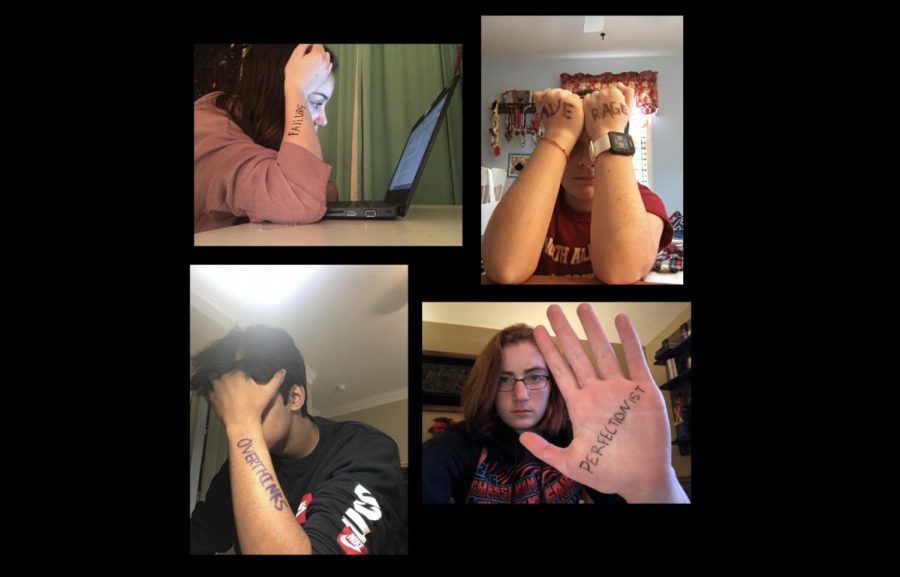Corrupt Competition Culture #4: I Was Never Like This…
Students weren’t always super competitive in school and in athletics; society has changed our attitudes for the worse.
Jess Daninhirsch, Claire Majerac, Samantha Podnar, Alok Shah
Student stress and anxieties aren’t always visible, but they are always there.
Every day I walk into my homeroom hearing different variations of the exact same thing:
How is this funny? It’s your health, first of all, and second, why on earth would you stay up until four in the morning studying for a test, when you could be sleeping and not cramming? Isn’t sleep supposed to help with testing? Since when was it cool to not sleep? It’s not a competition. Or is it?
Sometimes, I don’t even feel like I’ve studied enough until I nearly fall asleep at my laptop from being so brain-dead tired. For the record, I was never like this.
I always got good grades in school, and I’d stop studying once I knew the material for a test. After all, that was what made the most sense to me. It was sometime in ninth grade that I began to question how much I was studying. Kids in school would compare their hours of testing like it was a contest. They intimidated me. Even though they didn’t say anything to me at all, their hours of studying made me feel less confident, almost like I was dumb.
The next time I had a test, I studied way later than I usually do. I worked tirelessly throughout the night and into the early hours of the morning and gave myself little sporadic panic attacks along the way. I was in no shape to take a test the next day. And it was later reflected in my grade on the test.
I regret to admit that most nights I still do this, worrying about how my peers will do on the test. The uncertainty of whether or not they’ll think it was easy or hard, or whether I’ll be able to show my score without embarrassment, or have to hide it away from the wandering eyes of my classmates keeps me up and grinding out practice problems.
Our whole idea of “Competition Culture” has taken us by the hair and convinced us that everyone is our enemy, our adversary, and dragged us through a variety of mental health disorders including anxiety, depression, and even eating disorders.
Most students would rather not sleep, causing a multitude of health problems, than help their brains. This has to say something about our intense level of competition.
Say you’re about to take a test in your worst subject. You’re going over your quizlet about the information, acing it. You feel good. The bell rings, and you walk into the classroom, feeling prepared and ready. At scattered places around the room, kids from the period before are writing feverishly on their papers. You see the smart kid get up, turn his test in, and then mutter as he walks out:
After putting in hours of studying, a small comment from a peer can derail our composure. The key is to not let others’ mind games trigger a spiral of bad performance.
Your stomach clenches and fills with dread. Maybe understanding the material was just the surface, maybe you didn’t understand deeply enough. You think maybe you understood the big picture ideas, but not the little ones.
The teacher passes out the test, and you blank as soon as you see the first question. You recognize the words, they were even in your Quizlet set, but you can’t string them together. You’re still hung up on the kid who said he failed.
Distraction consumes you throughout the test, and you turn in something which is less than your best work.
If you play sports, perhaps you have witnessed that little side glance someone from the other team gives you right before the competition begins. It’s terrifying. But somehow, it resonates in our heads. You spend your time obsessing about it, and all of a sudden, they’ve completely psyched you out. You’re off your game.
This “fake it ‘till you make it” attitude has affected more than just schools and education, though. It also affects our sports. To some, sports are a place for kids to relax and let loose, but according to a study, nearly 1 in 7 high school athletes are taking anabolic steroids in order to boost their performances in sports.
The simple answer to this would be: it’s not our fault, those athletes chose to take steroids. But really, was it up to them? Fifty percent of students caught using performance-enhancing drugs report that they were given steroids by a coach or physical trainer.
Excessive competition leads to corruption in our society. An attitude of getting ahead at any cost, regardless of the impact it has on others makes society unfair. However, the solution is cooperation and respect for the well-being of humankind.
Regardless of the consequences, students and athletes have too much incentive to cheat in order to achieve more. There is a report in ScienceDirect that shows even with increased restrictions, when students transitioned from middle school to high school, “cheating increased after the transition.” Deterrents against cheating don’t seem to be making much of an impact.
Schools can crack-down on cheating and performance-enhancing drugs as much as they want, but at the end of the day, humans are humans, and they’ll resort to drastic measures to get their way. Unfortunately, cheating and getting ahead at any cost has become the norm in our cultural system due to rampant competition among students everywhere.

Claire Majerac is a sophomore at NAI. She likes to run, write, and she enjoys seeing her friends at school. Her favorite food is macaroni and cheese.




Flo Majerac • May 7, 2020 at 7:07 pm
Great article. How long did it take you to write this?
Grandpa and I are so very proud of you.
Love,
Grandma